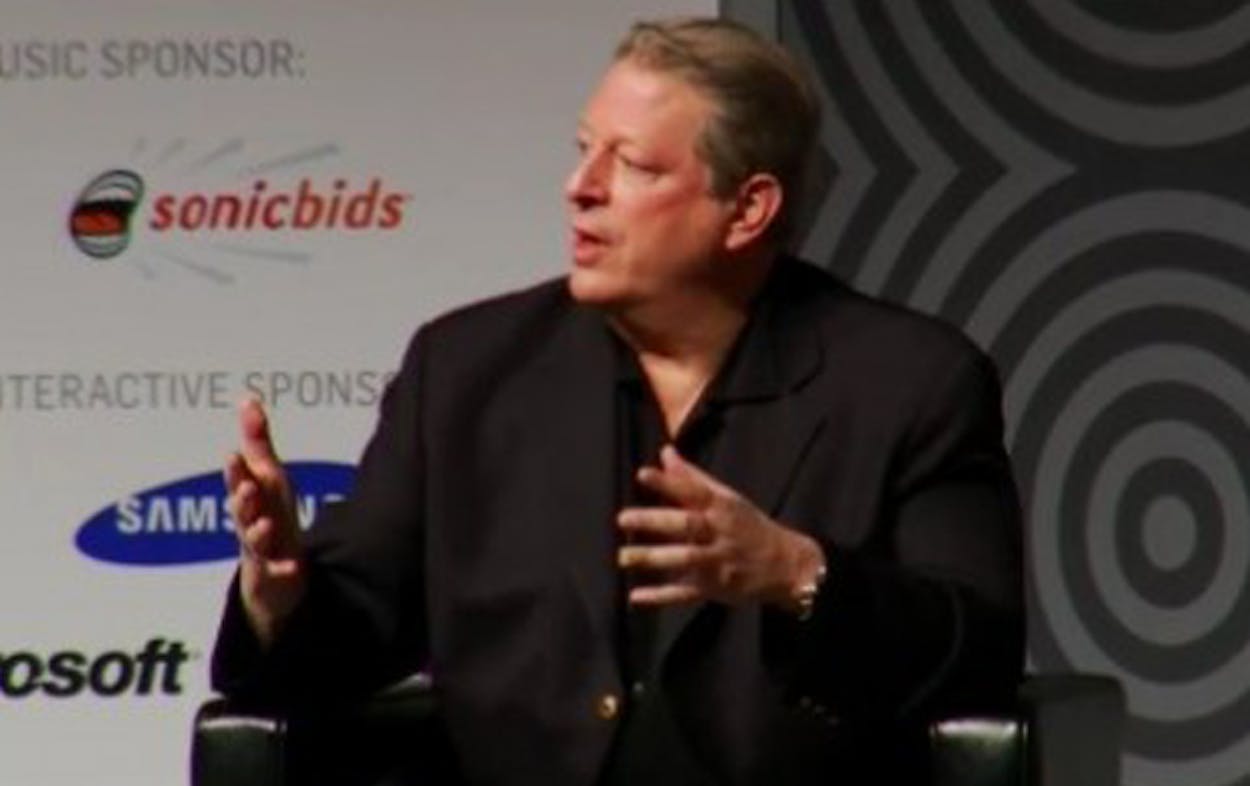Former U.S. vice president Al Gore’s SXSW Interactive appearance with social media zelig Sean Parker (Napster, Plaxo, Facebook, Causes.com) Monday didn’t have a name like all the other panels at the conference, but it could have easily been, “When is all this social media stuff finally gonna be worth something politically?” Gore began and ended the talk, which took place in the Austin Convention Center’s cavernous Exhibit Hall 5, by calling for the digital world to “occupy Democracy.”
“Our democracy has been hacked,” Gore, whose current projects include Current TV, the Climate Reality Project, and sustainable investing, said in his lengthy opening remarks. “It no longer works, in the main, to serve the best interests of the people of this country.”
Sounding very much like a man whose political career is over, thereby freeing him to criticize elected officials for being in the pocket of big donors and corporations, Gore suggested that if the invention of the printing press helped undo the feudal system, television changed that back. “For all the optimism about the Internet,” he said, “we still live in the age of television.”
And television–and the ad dollars needed to get on it–are what drive today’s politics. Gore later noted that if Thomas Paine had written Common Sense (which he called “the Harry Potter of the eighteenth century”) today, he’d have had do a $5 million ad buy to get his ideas out.
“The role of money has grown and grown and grown, and the quality of the democratic discourse in our federal government has gone down and down and down,” Gore said, calling the Supreme Court’s 2010 Citizen’s United decision “damnable.” (He also got a a laugh line out of that: “coming from a Supreme Court with whom I’ve not always agreed anyway.”)
If the Internet can help to change things, Gore and Parker both acknowledged that it hasn’t happened yet. Said Parker, to inevitable titters:
Just having large numbers of people on social media doesn’t mean we’re going to do anything other than create virtual farms–innovate newer and more psychologically addictive ways of wasting people’s time. I’m the first one to be guilty of a lot of that.
He continued: “How come these platforms aren’t being used to get anything done? Why are there no interesting utilitarian aplications of these platforms?”
Parker said the challenge was to move beyond “armchair activism.” Websites or organizations that are interested in political action, or in becoming a medium that helps blunt the importance of expensive television exposure, must first acquire large numbers of users and then gradually move them up in levels of engagement. Both Gore and Parker suggested that the recent outcry over Texas Republican Lamar Smith’s SOPA (“Stop Online Piracy Act) was a pivotal moment where online chatter became real-life action. Parker called it “Nerd Spring,” a typically grandiose, if not outright offensive, comparison to Arab Spring.
Gore also said he thought that if Facebook and Twitter had been around in 2002, “the truth about that hogwash that was being put out about the invasion of Iraq would have been countered” (including the popular conception that there was a connection between Saddam Hussein and 9/11).
Smart as the talk was, it also had an unmistakable preaching-to-the-converted vibe. On a few occasions, the giant space seemed necessary just so there’d be room for all the self-congratulation.
“Coming from Al Gore, that’s pretty cool!” Parker said when Gore praised Causes.com.
“When Shawn Parker says, ‘you can’t disagree with that,’ that’s pretty cool,” Gore echoed at another point.
The talk also became rather tone-deaf when Parker, seeking to illustrate a point about how powerful the Internet can be, good-humoredly blamed himself (as a co-founder of Napster) for helping to kill the music business.
“Not necessarily something I’m proud of,” he said. To which Gore replied, “as a member of the board of Apple, I’m real happy about the way it’s evolved.”
That prompted Parker to concede that as a member of the board of Spotify, he’d didn’t mind either. To which Gore added that he was an investor in Spotify.
At the talk’s end, Gore, who, though unmistakably longwinded, is also a more impassioned speaker than he was during his time running for office, repeated his call to “occupy Democracy” and suggested that, as with the civil rights movement, political change will actually be bottoms-up. “Win the conversation,” he said, and elected officials and the political system will eventually have no choice but to accomodate the winning point of view.
“The Internet is the most fantastic tool ever brought into being to make things right, and to fix our democracy,” he said. “We can use it. It is going to happen.”
- More About:
- Politics & Policy







